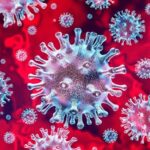
As more time passes and more information is gathered on the novel coronavirus, SARS-CoV-2, there is growing evidence that any infection from COVID-19 may cause chronic damage to your body.
Negative Feedback Loops
The more often your body suffers damage, than the more severe each additional exposure will become. After you recover from COVID, there is likely some damage to one or more of your organs. Even asymptomatic individuals may suffer chronic illness. Immunity from COVID antibodies appears to be short lived. A person gets COVID, spreads COVID, and gets it again. Each time you get COVID-19, you are more compromised. The negative feedback loop repeats until failure.
Originally, researchers thought you could only catch COVID-19 once, and you would gain immunity. Scientists started off thinking you would have a minimum of 1 year immunity and quite possibly 2-3 years. Now, 6 months later, that theory is history.
There are several cases globally where reinfection was confirmed by identifying that the second infection was by a different mutation of COVID than the original infection. “So far, there are three patients known to have been infected with SARS-CoV-2 twice, and in at least one case the second time around was asymptomatic.”(1) Reinfection is rare, researchers said, but people should still be cautious. “If you’ve had it, you can’t necessarily be considered invulnerable to the infection,” Mark Pandori, one of the authors and director of the Nevada State Public Health Laboratory said.(2)
UPDATE: COVID-19: Chronic Conditions
October 15, 2021
COVID causes negative feedback loops. COVID appears to cause the most damage to the weakest or most vulnerable parts of the body. If you were predisposed to a condition prior to COVID, you will likely develop the condition after COVID. An example would be people with type II diabetes. If you have diabetes prior to COVID, then you are at high risk of dying from COVID. If you are prediabetic, COVID will likely make you diabetic. If you are not inclined to develop diabetes, COVID will likely increase the probability of developing diabetes. The same holds true with NAD+, IDO, P53 tumor suppression genes, and all the other conditions listed above. The more times you contract COVID, the more cumulative damage you will suffer.
UPDATE: Reinfection Greater Risks & Exacerbates Underlying Conditions
November 11, 2022
The study Acute and postacute sequelae associated with SARS-CoV-2 reinfection was published in the Journal Nature.
* The evidence shows that reinfection further increases risks of death, hospitalization and damage to multiple organ systems
* COVID exacerbates underlying conditions including pulmonary, cardiovascular, hematological, diabetes, gastrointestinal, kidney, mental health, musculoskeletal and neurological disorders
First infection with severe acute respiratory syndrome coronavirus 2 (SARS-CoV-2) is associated with increased risk of acute and postacute death and sequelae in various organ systems. Compared to no reinfection, reinfection contributed additional risks of death, hospitalization, and sequelae including pulmonary, cardiovascular, hematological, diabetes, gastrointestinal, kidney, mental health, musculoskeletal and neurological disorders. The risks were evident regardless of vaccination status. The risks were most pronounced in the acute phase but persisted in the postacute phase at 6 months. Compared to noninfected controls, cumulative risks and burdens of repeat infection increased according to the number of infections. Limitations included a cohort of mostly white males. The evidence shows that reinfection further increases risks of death, hospitalization and sequelae in multiple organ systems in the acute and postacute phase. Reducing overall burden of death and disease due to SARS-CoV-2 will require strategies for reinfection prevention.
More on COVID-19: Chronic Conditions
1. Patients Reinfected with Coronavirus in Hong Kong, Europe (The Scientist)
2. 1st U.S. COVID-19 Reinfection Reported in Nevada Patient (WebMD / NBC)